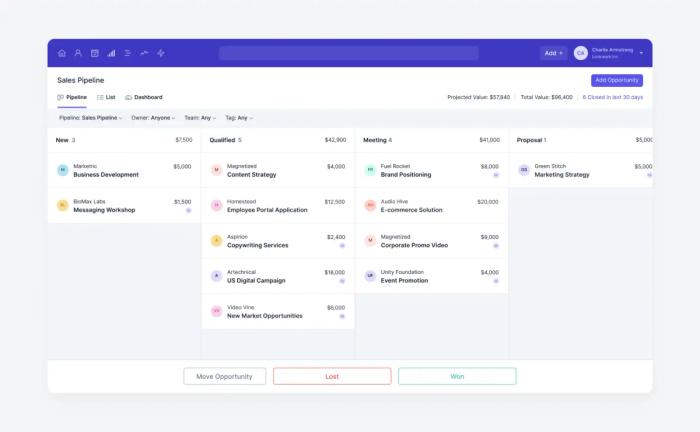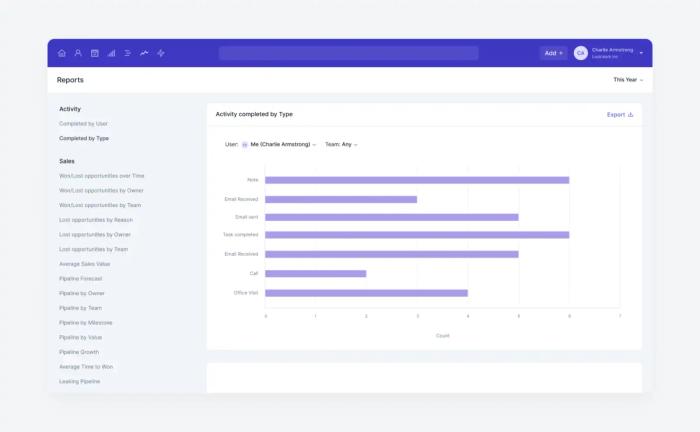Running a business can be hard. That's why so many choose to implement a CRM system to take control of business operations such as sales, marketing and delivery of client work, and internal projects.
But to make the most of your CRM you must know how to implement a CRM system. With so much information out there, it’s tricky to know where to start and this guide is essential for getting you and your team using a CRM as quickly as possible.
In this article, we'll discuss why small businesses need a CRM, how to help your employees understand the new processes and discuss vital best practices from CRM expert Julia Blake of Blake Consultants.
What is a CRM?
CRM stands for customer relationship management. CRM refers to the strategies, technologies, and practices that businesses use to manage and analyze the customer experience, and their experience with other groups of contacts, such as partners and suppliers. This is done via interactions and data collected throughout the relationship.
When implemented and utilized right, CRM can improve business relationships, streamline processes, and ultimately keep your customers happy.
Key Components of a CRM
- Customer data management: CRM helps you organize and analyze all your collected customer data in one easy-to-manage database.
- Sales automation: CRM technology helps you, and your sales team - if you have one - streamline sales activities by helping with contact management, lead tracking, and sales forecasting.
- Marketing automation: Streamlining your email, social campaigns, and other online activities with marketing automation can help you, and your marketing team, focus on the bigger picture.
- Customer support and service: Storing all your customer feedback in one place helps you, and your customer service team, keep track of and manage what you deliver, and inquiries about your services, in one easy-to-manage space.
- Analytics: Explore your customer data and analytics to gain real insight into your customer's behaviors and preferences to make data-driven decisions.
What is CRM implementation?
CRM implementation is the process of integrating CRM software into your day-to-day business practices. Before you can begin managing your pipelines and buyer journeys you need to set up your CRM software, so that you can fulfil the needs of your business.
Julia Blake is a systems strategist and consultant who specializes in developing clear and effective systems and processes for service-based business owners. She has been a Director at Blake Consultants for close to 15 years. (and she's also a huge fan of Capsule!)
She says: “You want to choose a system that matches your requirements, as closely as possible, and can be easily set up for the CRM users in your business so that you and your team are up and running quickly. This way you get a great return on investment (time, energy and money) as soon as possible.”
Effective CRM implementation ensures that you and your business get the full value of your CRM platform. While the right tool can help your business grow, you need to ensure that your implementation team has all the information they need to get started.
A good implementation plan guarantees that you and your team can get up and running on your new system quickly. The sooner your team gets started using your new CRM platform, the quicker you'll see results.
How can a CRM help businesses?
Unsure whether you need a CRM? Let’s explore the biggest benefits here:
Manage your sales cycle
Good CRM systems give you an overview of the entire sales cycle. They enable you to build a sales process that works for your ideal customer, giving the best chance possible of closing a deal. They let you know where prospects are within your pipeline so you can adapt your interactions and messaging to better reach your prospects.

This is quite possibly the first interaction that you have with a prospect, needless to say - it must be a good one and, overall, a great experience.
Tailoring your sales process, based on your ideal clients' needs can help you move prospects through the sales funnel quickly and more effectively. This can ultimately save you time and resources, reducing your cost of sales and improving your bottom line.
Improve customer satisfaction
CRMs are a great tool to help manage your customer satisfaction levels. The most successful businesses understand the importance of customer loyalty and customer lifetime value.
Happy customers want to support your business. This means they'll not only continue to work with you, boosting customer retention, but they'll likely become brand ambassadors and refer others to your organization.
Sales and marketing alignment
Alignment of sales and marketing is an important part of any organizational success. By streamlining your project management process, you, and your team, will have a better understanding of your roles in the customer journey.
Alignment is especially important when it comes to your marketing and sales team. With a CRM they can share strategies, plans and essential customer data helping them work as a cohesive unit.
Data-driven decisions
Business leaders constantly make important decisions about the direction of their organization. Customer data is invaluable to make these decisions because you can evaluate your customer pain points and what has been successful in the past.

This data works across your business, marketers can use it to realign their campaigns, and sales teams can make better choices about how to invest their time and resources.
How to implement a CRM system
So, we've discussed what CRM is and why it's important for both small and larger businesses. Now, it's time to explore how to successfully implement your own CRM.
Let’s explore Julia’s best tips for implementing a CRM.
Understanding the Purpose of CRM
Julia's first piece of advice is to consider the purpose of a CRM. Think about what issues are affecting your current business processes and what could be done to solve them.
Julia says "We can all get carried away with lovely, sparkly, shiny things but it's important to really think about the purpose of CRM within your business."
It's important to consider the future needs of your business, not just the issues that you're currently facing. When choosing a CRM it's important to select one that grows alongside you and your future business needs. This means that you can keep your current customers happy while finding new ways to nurture leads and bring in new business.
She adds "A good CRM should help with your reporting and your analytics, enabling you to improve how you run your business. You should always design your CRM with the future in mind."
Revenue growth and stress reduction
A great CRM reaches lots of different parts of a business. It's not just about giving you more sales, it should also decrease the stress around customer relationship management. Losing data can be a common problem faced by a lot of businesses, a CRM offers a solution meaning you can focus more of your time on finding creative solutions to other business challenges.
Julia says: "A CRM solution can significantly reduce how overwhelmed and stressed we feel, providing us with valuable time. This time can then be allocated to fostering creativity, which flourishes when stress levels are low.
"With the right CRM setup, you gain the freedom to run your business efficiently while also carving out dedicated time for creative pursuits, ultimately enabling you to innovate and grow your businesses."
Engagement and user buy-in
When deciding on a CRM, it's important to get input from your whole team. Julia says to consider key players within your organization, whether you're a one-man band or a larger organization.
Julia says: "It's really important to get people to engage with a CRM project by involving them in the implementation process.
“You need to listen to your team and give them time to share their input as a user. It’s all well and good having a CRM but if your and/or your team doesn’t use it then it’s a waste of valuable resources”
Consider who the key decision makers in your business are and how they impact and manage the internal processes, and ask what essential features their ideal CRM software would include.
Customization and brand alignment
When choosing CRM solutions, the right one for your business is the one that can be fully customized to fit your business needs. With Capsule you can add tags, custom fields, task categories and activity types - all of which mean that you are customizing the system to support your business.
Uploading your logo and changing the branding colors means users feel like part of the team, as soon as they log on, instead of just a software user.
Julia says: "From an aesthetic point of view, you want to choose a CRM that you can make as on-brand as possible. Customizable features are a great way to help users become emotionally engaged with the product, this increases the value the user gets, leading to an increase in the return on investment."
Integrating other software is crucial. Capsule connects to over 50 different third-party apps, helping you consolidate all your data in one each to access space. You want to be able to easily access the apps you use daily in one easy-to-manage place. That way you can avoid having to switch apps in the middle of a project, saving you valuable time.
On integrations, Julia says: “Most of all, integrations are a way for businesses to get all their software talking to one another.
“Integrations, prevent your data from being siloed in each of your software solutions. Integrations with packages such as Xero, Quickbooks and FreeAgent are game-changers for business owners.”
Determining your target audience
When setting up your customer relationship management CRM system you must consider both the organizational and individual needs of your clients. Defining your ideal customer profile or ICP is crucial - it helps you understand both the businesses they represent and the individual pain points that key decision-makers in this business experience. For example, companies that focus mostly on B2B sales could break down their ICP based on each sector.
However, Julia has some better advice: "While a business in a particular sector might have some common problems, your ICP is a person within that organization. Although the commercial relationship is with the business, it's a human that has the problem and makes the decisions - so remember to put yourself in their shoes."
By empathizing with your client's needs and challenges, you can tailor your own CRM solutions to capture information that truly serves them. Remember, CRMs aren't just about managing client relationships; they're vital for small businesses that want to nurture crucial business relationships.
Client and contact management
CRMs are more than just a bit of tech, a well-configured one is an all-encompassing contact relationship management system. Small, medium and large businesses must constantly manage the contacts of associates, suppliers, partners, and customers just to keep their business running smoothly.
Julia says: "We're reliant on these contacts, so it's really important to treat them with respect and be mindful of their needs. By acknowledging the importance of all contacts and treating them with respect, businesses can effectively manage their relationships and ensure smooth operations."
Capsule’s contact management tools offer users a contact-centric perspective, meaning businesses can cater to the diverse needs of stakeholders with ease. Tools like quick search use text, email and field matching to ensure you can access the details you need in a flash. Tags and DataTags give us the ability to group our contacts and efficiently capture relevant information about the different groups.
Data management and tagging
It’s not enough to just store data, you need to keep it organized to make the most of it. Tools like quick search can help you sift through the data, but it’s better to keep contacts stored under categories or ‘tags’.
Julia says: ”Utilizing tags and custom fields helps you improve your overall relationship management. Tags, such as ‘prospects,’ ‘clients,’ and ‘previous clients,’ help you track contacts along their customer journey.
“Custom fields, like ‘industry’ or ‘source of contact,’ also provide additional context, essential for segmentation and understanding more about your prospective customers.”
DataTags also add more sophistication by capturing specific data related to a tag, such as networking events attended. However, it's crucial to avoid going too deep into this and instead use custom fields appropriately to capture relevant information, such as location, industry, or role within an organization.
Julia says: "We need to remember the importance of data protection and always act ethically. Think about what data you need to capture and how you are going to use it.
“While you can use custom fields for social things like noting a client's birthday so you send them a card, you should be mindful of boundaries."
Blake adds: “Before fully implementing, it's a necessity to test the system with a few records from each group of contacts to ensure all necessary data is being captured effectively. And in a way that it can be searched on and drilled down into, if needed.
“Start by strategically mapping out Tags, DataTags and custom fields in all areas of the CRM, then see if any changes need to be made to your current business process.”
Pipeline and revenue stream management
Capsule CRM helps keep potential revenue tracking simple. Julia explains that the pipeline can be divided into milestones so you can track the entire customer journey.
Custom fields and Tags and DataTags in the pipeline help manage opportunities effectively, by allowing you to categorize leads. It's crucial to track why certain revenue streams aren't performing as well as others so you can refine processes and improve conversions.
Julia says: "Capsule, like many CRM systems, has different subscription tiers depending on how complex your sales pipeline is.
“If you have a pipeline with just one revenue stream then the basic plan will work for you. But if you have more than one revenue stream that has a different sales process, then you'd want to look at the next plan up."
By aligning sales processes, tracking lost opportunities, and utilizing projects effectively, you can streamline your business operations.
Project management and delivery
Project management is crucial for delivering excellent services to clients. If you’ve got multiple revenue streams, you may need to create separate project boards to align with different sales processes and delivery methods.
Julia says: "Every business owner knows the value of tracking essential milestones and having clear objectives. These works to guide the progression of client engagements and facilitate the movement of projects in various stages."
Ensuring that all members of a project have a total overall view of where things are at helps the client managers delegate ownership of tasks and look after their clients in a way in which the client wants to be looked after.
She adds: "Each project should reflect how you deliver your products or services to your clients. Tracks can be set up to facilitate the movement of deliverable work through various departments and stages, ensuring smooth delivery and client satisfaction."
Integration and system review
Julia explains that she considers there to be three main areas in Capsule: the databank, pipeline and projects.
The databank is where all your contacts reside, all your prospects, potential clients, actual clients, partners, associates, suppliers, etc The pipeline is where you keep on top of your opportunities.
The projects area is where you can manage what you deliver to your clients, your partner programme or internal projects. After designing your data bank, pipeline, and projects, you need to build each component.
Once all three areas are completed and the system is refined, you need to add some test data and pressure test the entire CRM,
Julia suggests: “Really try and ‘break’ your CRM at this point, because it’s way easier to make changes now rather than after all of your data has been imported, or if you’ve been using it for some time and growing it organically!”
Next, review your findings, and adapt the components based on any potential findings, and make sure you are happy with the whole CRM.
Data Import
When you are happy that the whole system is as you want it to be, you can create a plan to import your data.
You might want to grow your CRM organically. As Julia says: "Integration with email providers like Outlook or Gmail is essential and is a game changer in the data migration process."
When importing data, consider creating a master import document to help you enrich the data, and tag it properly for every person and organization. You can add data to custom fields in this process too.
Other integration systems like Transpond and Xero can also add additional functionality to your Capsule implementation, helping you bring more data, and ultimately, better decision-making and ability to execute essential business activities.
Training and implementation
Although CRM software like Capsule can be intuitive, training your staff on them effectively is a crucial part of the CRM implementation process. It's more than just the sales team that you need to think about, a CRM platform can be used by marketers, customer service managers, and your finance team to help your whole company stay aligned.
Julia says: "Encouraging emotional buy-in is key when it comes to your CRM implementation strategy. If you, and/or your team aren’t using the software correctly you could be missing out on key benefits like an up-to-date pipeline, streamlined solutions and improved productivity.”
Successful CRM implementation isn’t a one-off project. Solutions like Capsule are constantly launching new features to better support their users so continual learning is key.
Top Capsule features
Julia specializes in helping small to medium-sized businesses get up and running with their own CRM. She’s helped hundreds of businesses get started and understands what CRM software needs to help make users successful.
Capsule’s benefits have already helped thousands of customers take control of their customer relationships and streamline their previous processes. Capsule’s key benefits include:
- Organize contacts: Capsule keeps all your contacts in one place, eliminating the need to search through various sources.
- Enhanced relationship management: With Capsule, you can track all your interactions, set reminders and note down important personal details to help you foster meaningful connections.
- Streamlined follow-ups and communications: Stay connected with your contacts and simplify communications by letting Capsule streamline your daily workflows.
- Insights into your network: CRMs like Capsule offer insights like contact frequency, common interests, and mutual connections, aiding in successful networking.
- Manage important dates and events: Capsule can help you maintain a better work-life balance by managing both personal dates and professional commitments.
- Informed decision-making: To make better-informed decisions, you need to keep detailed records of important customer information.
- Nurturing and growing relationships: Capsule helps customers nurture professional relationships by using data to strengthen bonds and explore collaboration opportunities.
- Efficiency in managing interactions: With Capsule, you can improve efficiency by streamlining tasks like scheduling meetings and prioritizing events.
When we asked Julia what she thought the biggest benefit using Capsule gave small business owners, she had this to say:
“A good CRM - like Capsule - is sort of like a clone of you or an extra team member. It reminds you to do things when they need to be done, especially when you set up tracks.
“And when you need to make a decision based on facts, without emotion, sales analytics is there to help you make those choices.”
Conclusion
Rolling out CRM usage across your business can sometimes be a struggle. It takes time to implement CRM software effectively and encouraging teams to make the most of the system can sometimes be an even bigger struggle.
While CRM investment might seem like a big expense, especially if you're a small business, the payoff is invaluable. With improved sales pipeline management, better customer retention rates, and improved customer relationships, it's a worthwhile investment.
Capsule helps you store all the data you need in one easy-to-manage space helping you to focus on the important stuff - like growing your business!
Looking to implement a CRM? Julia and her organization, Blake Consultants can help you better understand the process and how you can make the most of it. She’s already helped over 350 clients implement Capsule since 2010.




